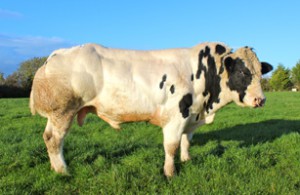 It is often said, quite correctly, that the bull is half the herd. That same bull is often presumed to be fertile. However studies have shown that 20% or more of unselected breeding bulls are classed as subfertile, and thus do not perform optimally.
It is often said, quite correctly, that the bull is half the herd. That same bull is often presumed to be fertile. However studies have shown that 20% or more of unselected breeding bulls are classed as subfertile, and thus do not perform optimally.
What is a fully fertile bull?
This is a bull which can impregnate > 90% of 50 normal cycling females in a 9 week period.
This requires good semen quality, quantity and delivery.
Why is subfertility a problem?
Targets for efficient beef herd fertility should be 95% pregnancy rate in a 9 week mating period with 65% or more of those cows calving in the first three weeks of the following calving season. These figures cannot be achieved without a fully fertile bull stud.
The economic benefits of less barren cows goes without saying but what is often overlooked is the the financial benefit of calving more cows in the first three weeks of the calving season. This will significantly increase average weaning weights.
For this reason all farmers should seriously consider routine fertility examinations of their stock bull as an essential part of herd fertility management.
What can I do?
At Frontier Vet Services in Enniscorthy, we carry out Bull Breeding Soundness Examinations for a few reasons –
• pre and post sale for young bulls
• routine check two months before the breeding season
• a suspected subfertile or infertile bull
The Bull Breeding Soundness Exam has three stages.
1. History and physical exam.
2. Examination of scrotum, testicles and seminal vesicles – size does matter, specifically scrotal circumference has a direct correlation with semen output. Interestingly, this is also related to daughter fertility.
3. Semen collection and assessment.
Advice when buying a bull
• When selecting a young bull, look for good foot and leg conformation.
• Avoid laminitis by sourcing bulls directly from breeders who have not forced them for sales.
• If buying at a sale, find out what diet bull was on before the sale and wean off this diet gradually.
• Enquire about the health status of the herd from which you are buying – notably tuberculosis, Johneʼs disease, IBR, BVD and leptospirosis.
Points to remember every year
• Donʼt assume your bull is fertile.
• Foot trimming of bulls should be routine.
• Observe your bull during the breeding season to ensure everything is working as it should.
At Frontier Vet Services in Enniscorthy we carry out routine prebreeding bull fertility examinations annually around 6-8 weeks prior to the breeding season.
Your bull will be included on any herd health plan carried out by Frontier Vet Services. At Frontier Vet Services, we advocate herd health plans because they are progressive, preventative roadmaps. We canʼt control the weather, but we can take steps ( many of them straightforward), to ensure that our animals are healthy, productive and disease free.
